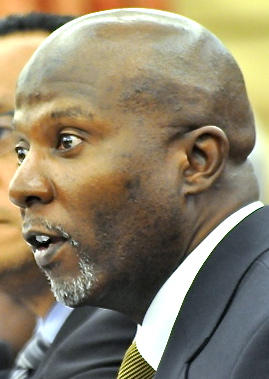.jpg)
In June, Government House sent down bonding legislation to address the government’s budget shortfall, to bolster the territory’s hospitals and to pay tens of millions of dollars in overdue utility bills for the hospitals and the Bureau of Corrections. That legislation included the increased flexibility for Paul E. Joseph Stadium bond funding. During session June 19, the V.I. Legislature tabled deJongh’s long-term bond bill. Senators instead special ordered a bill onto the agenda "to reissue a working capital loan in the amount of $50 million prior to the end of (Fiscal Year) 2014."
It says the "notes must mature no later than 270 days after issuance," meaning the full loan must be repaid in less than one year. It introduced and passed the alternative short-term loan authorization without debate or testimony after midnight.
That bill authorizes $12 million in new funding for JFL Hospital; $10.5 million to Schneider Regional Medical Center; and $12 million to pay the two hospitals’ and the Bureau of Corrections’ past-due utility bills. It also funds several small appropriations.
Testifying to the Senate Committee of the Whole before the session, Finance Commissioner Angel Dawson listed several problems with the Senate’s alternative borrowing bill. He said it spends millions of dollars money on projects for which there is already potential federal funding and still leaves a shortfall in this year’s budget. Left unfixed, this will result "in a sharp shock" toward the end of the fiscal year, when the government is unable to pay all its bills, Dawson said.
But the most serious problem is that it leaves no way to pay back the loan, and so no bank will lend the money without changing the law, Dawson said.
He said FirstBankVI, the holder of the current $50 million rolling line of credit, had already turned down the loan, reading from the FirstBankVI rejection letter.
In that letter, FirstBank Senior Vice President Joseph Hosie said the bank’s concern was that “it changes the short term nature of the credit facility to meet occasional cash flow needs of the government to a loan to cover deficit financings with no clear understanding of a source of repayment."
Hosie went on to say FirstBank would "assist" if the government were to "wish for FirstBank to consider converting the current cash flow facility into a term loan."
The chief executive officers of the Water and Power Authority and both the territory’s hospitals testified to the damage that would be done without immediate cash infusions.
Luis Hospital will not be able to make its next payroll unless it gets a big cash infusion nearly instantly, Chief Executive Officer Kendall Griffith said. He said the hospital covered the last two payrolls only by drastically cutting or holding vendor payments. As of June 11, Luis Hospital had $46,000 cash in the bank and cannot make the July 24 payroll without an immediate infusion of $2.6 million, according to Griffith.
WAPA is already being forced to forego critical maintenance and is getting critical attention from bond rating agencies because government agencies currently owe almost $41 million in utility bills, WAPA Executive Director Hugo Hodge Jr. said. That debt is primarily for the two hospitals and Bureau of Corrections. If WAPA’s bond rating suffers, so does the government’s, Hodge said.
“The government is the authority’s largest customer and our bond ratings, overall financial strength that gives us access to financial markets, and ability to pay our bond holders depend on payment from the government,” Hodge said. “This fact does not go unnoticed by the bondholder and the rating agencies," he said.
The second section of the bill would allow the government to pledge either Matching Fund Revenues or Gross Receipts Taxes to secure financing for the demolition and rebuilding of the Paul E. Joseph Stadium in Frederiksted.
"If nothing is done with this amendment, can you still go to the market for bonds?" asked Sen. Clifford Graham.
"If nothing is done (on the legislation) we can only use the Community Facilities Trust Fund," Dawson replied.
"So at the end of the day, you can still go to the market. … All you want is the flexibility?" Graham asked.
"That is correct," Dawson said.
The Senate voted to split off the Paul E. Joseph Stadium portion of the bill and send it to committee. Eleven senators voted yea; Sens. Alicia "Chucky" Hansen, Myron Jackson and Sammuel Sanes voted no. Sen. Judi Buckley was absent.
The Senate voted 14-0 to authorize the government to convert the short-term $50 million loan into a long term loan or bond secured by gross receipts taxes, with Buckley absent.



